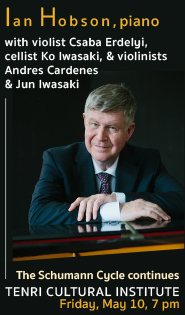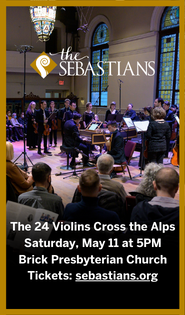Wang shows depth greater than surface fire at Carnegie Hall
The most mesmerizing thing about watching Yuja Wang play the piano is her hands: they skitter and flow across the keyboard like elegant spiders, drawing fleet, powerful sounds from the instrument.
In her concert Tuesday night at Carnegie Hall, the first of this seasons’s Keyboard Virtuosos series, one was impressed with how she balances her hands with her mind, her execution with her musical thinking. There is no shortage of young pianists who have the dexterity and strength to set fire to the keyboard, and many of them play as if the piano truly was burning. There are fewer who can focus attention on how quietly or slowly they play, and Wang is one.
Her program consisted of Prokofiev’s Piano Sonata No. 3 in A Minor; the Piano Sonata No. 3 in B Minor, Nocturne in C Minor, Op. 48, No. 1 and Ballade No. 3 in A-flat Major, Op. 47 by Chopin; Nicolai Kapustin’s Variations for Piano, Op. 41 and Stravinsky’s Three Movements from Petrouchka. This repertoire demands a mix of bravura playing and deep expression that she mostly fulfilled. The results went directly against the grain of the expectations that normally follow young, hyped and highly talented musicians.
For Wang, slower is better. In passages like the Largo of the Chopin Sonata, the brief scene in Petrouchka’s room from the ballet transcription, and the whole of the Nocturne, she can display her sensitivity to space and a truly beautiful feel for a long, sustained phrase. She varied the dynamics in Chopin’s melodies in a way that made them sing, and she played the theme of the Ballade with uncommon subtlety–almost stepping aside to allow it to reveal itself gradually and affectingly from the texture of the keyboard. It was clear she had thought this music through.
This wasn’t as clear in the faster, denser music. Her playing was impeccable – she has ideal hand position that allows her to handle both velocity and intense physical attack with aplomb – but her ideas about the music are fuzzy. From the start, she could not work out a clear, fixed pulse and rhythmic phrasing in the Prokofiev sonata, and the Scherzo movement of the Chopin sonata had the same problem. She handled all the notes, but was uncertain about where to put them in the flow of time and ended up eliding some articulations.
The music from Petrouchka suffered in the same way, heavily so in the opening fanfare, but this piece came at the end of the program and it seemed likelier that fatigue was setting in. Other than that, she bulldozed her way through the Stravinsky, missing the drama for the notes, in what was the sole unsatisfying playing of the evening. She finally left the vivid and unexpected impression that she was at her best when she could not step behind a flurry of activity and instead had to put her ideas to the fore.
There was also a surprise in the program’s highlight, which was Kapustin’s piece, a set of variations on the opening bassoon theme from The Rite of Spring. His music is rarely heard in concert but he’s a favorite with many pianists. He writes expressive, intelligent, witty music that fully challenges pianistic skills. The Variations seem just a showpiece at first, even trite, but by the time Kapustin develops a winsome ballad and set of chords from the original theme the spell has been cast. It’s a jazzy piece with a heavy-duty Art Tatum flavor in it, and it’s beyond refreshing to hear a classical pianist like Wang who understands and can play the Tatum style.
It’s not that she swings, but she does have some swagger. Tatum reappeared in one of her four encores, a transcription of his marvelous take on Tea for Two. It’s really a reduction: for all her skills she doesn’t have his left hand, his reach, or his sense of stride, but her playing was direct and full of fun.
The encores, in fact, turned out to be the best part of the concert. She was relaxed and her expression was transparent in a new way, as if she was no longer trying to impress and was just playing music how she liked.
She concluded with the Rachmaninoff Elegié in E-flat Minor, which came after the Tatum and an uncommonly fast and skillful Prokofiev Toccata in D Minor. This had none of the flaws of her earlier playing, and was remarkable for her exciting, almost mechanically consistent rhythms. The first encore was an exceptionally lovely and evocative Chopin Waltz in C-sharp Minor, Op. 64, No. 2. It was unusually slow and exposed, and seemed like a minimal bit of music through which she had a vast and affecting amount to say.
Keyboard Virtuosos continues November 5 with a concert from Andras Schiff.









Posted Oct 26, 2013 at 12:01 am by Dave
Was this reviewer really there for the entire concert? Given the gross inaccuracies in the review, I wonder. It seems that the correct encores and their order were actually
RACHMANINOFF Vocalise, Op. 34, No. 14 (arr. Kocsis)
BIZET Carmen Variations (arr. Horowitz)
YOUMANS “Tea for Two” from No, No, Nanette (arr. Tatum)
CHOPIN Waltz in C-sharp Minor, Op. 64, No. 2
Posted Oct 26, 2013 at 10:27 am by George Grella
Yep, there for the whole thing. I do apologize for mislabeling the Rachmaninoff encore and confusing the Carmen variations was working from memory late at night. The description of her technique and expression remain valid.
It’s unclear what issues you have with the other encores. The Chopin is labeled exactly as you prefer. Of course Vincent Youmans wrote “Tea for Two,” but what Wang plays is Tatum, not Youmans, and the point is that while even I can play “Tea for Two,” not even Wang can play Art Tatum.
Posted Nov 06, 2013 at 6:54 pm by kiyo yafuso
Picky, picky – Who cares what Yuja Wang wears – Yuja Wang’s playing is magnificent and exceptional – those who obsess on her red dress are those unable to appreciate a rare top classical pianist that doesn’t come along very often.